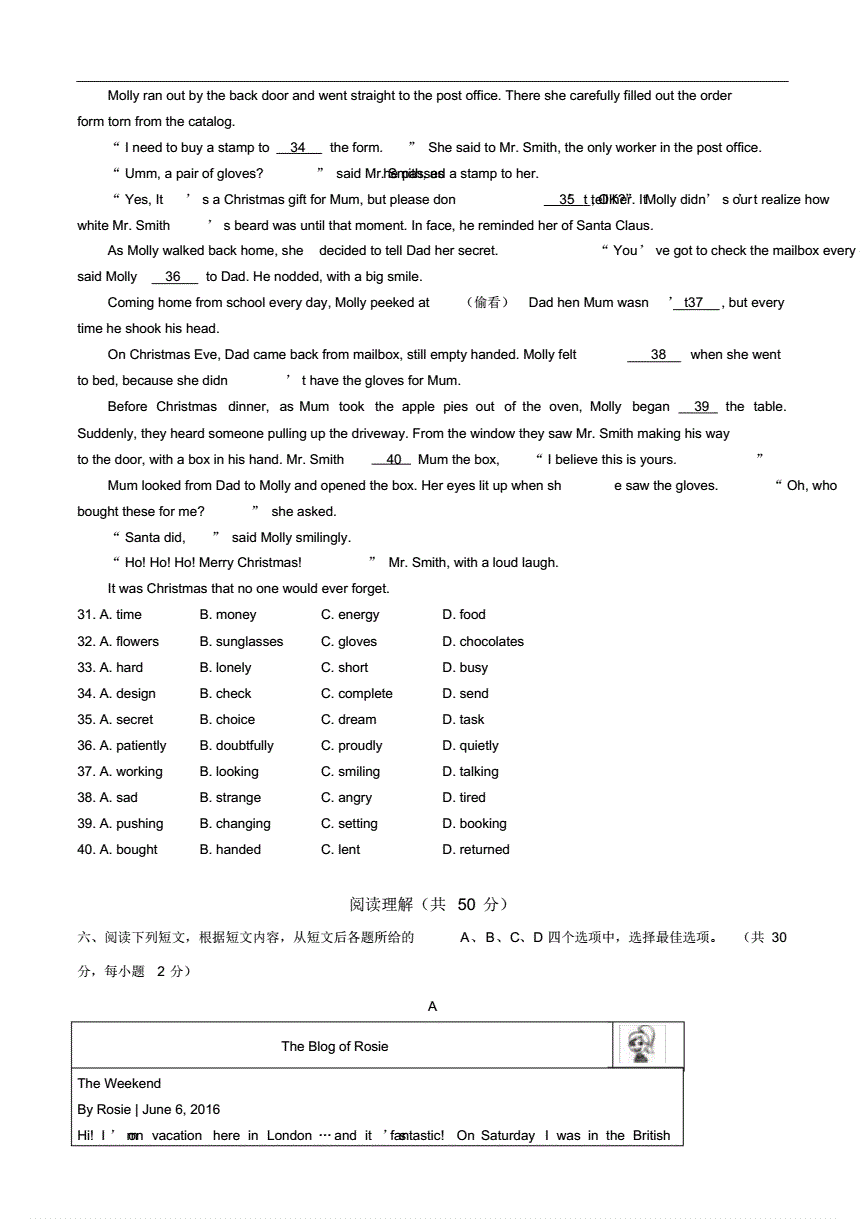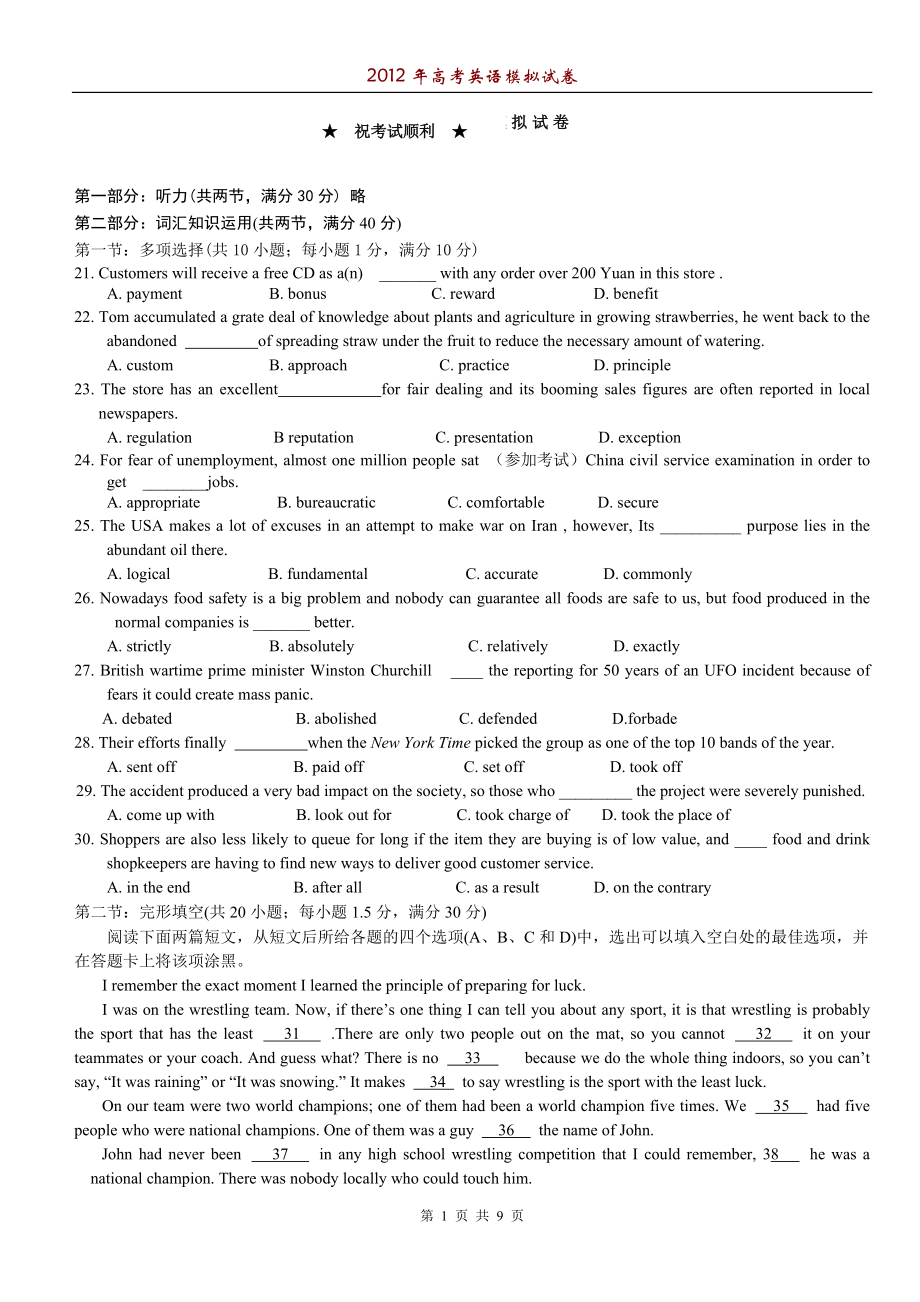大学英语四级模拟题一及答案 2 大学英语四级模拟题二及答案 34 大学英语四级模拟题三及答案 62 大学英语四级模拟题四及答案 103 大学英语四级模拟题五及答案 135 大学英语四级模拟题六及答案 183 大学英语四级模拟题七及答案 210 大学英语四级模拟题八及答案 235 大学英语四级模拟题九及答案 268 大学英语四级模拟题十及答案 300 大学英语四级模拟题十一及答案 350 大学英语四级模拟题十二及答案 369 大学英语四级模拟题十三及答案 387 大学英语四级模拟题十四及答案 425 大学英语四级模拟题十五及答案 473 大学英语四级模拟题十六及答案 522 大学英语四级模拟题十七及答案 583 大学英语四级模拟题十八及答案 639 大学英语四级模拟题十九及答案 685 大学英语四级模拟题二十及答案 731 大学英语四级模拟题一及答案 大学英语四级模拟题一及答案 Part I Writing (30 minutes) Directions: For this part, you are allowed 30 minutes to write a short essay on the topic of To Get along with Your Roommates. You should write at least 120 words following the outline given below. 1. 室友之间的冲突在校园里常有发生 2. 冲突的主要原因 3. 室友之间如何和睦相处 To Get along with Your Roommate 注意: 此部分试题在答题卡 1 上。

Part II Reading Comprehension (Skimming and Scanning) (15 minutes) Directions: In this part, you will have 15 minutes to go over the passage quickly and answer the questions on Answer sheet 1. For questions 17, mark Y (for YES) if the statement agrees with the information given in the passage; N (for NO) if the statement contradicts the information given in the passage; NG (for NOT GIVEN) if the information is not given in the passage. For questions 810, complete the sentences with the information given in the passage. Early Childhood Education ‘Education To Be More’ was published last August. It was the report of the New Zealand Government’ s Early Childhood Care and Education Working Group. The report argued for enhanced equity (公平) of access and better funding for childcare and early childhood education institutions. Unquestionably,that’ s a real need; but since parents don’ t normally send children to preschools until the age of three英语四级模拟题, are we missing out on the most important years of all? A 13year study of early childhood development at Harvard University has shown that, by the age of three, most children have the potential to understand about 1000 words most of the language they will use in ordinary conversation for the rest of their lives. Furthermore, research has shown that while every child is born with a natural curiosity, it can be suppressed dramatically during the second and third years of life. Researchers claim that the human personality is formed during the first two years of life, and during the first three years children learn the basic skills they will use in all their later learning both at home and at school. Once over the age of three, children continue to expand on existing knowledge of the world. It is generally acknowledged that young people from poorer socioeconomic backgrounds tend to do less well in our education system. That’ s observed not just in New Zealand, but also in Australia, Britain and America. In an attempt to overcome that educational underachievement, a nationwide program called ‘Headstart’ was launched in the United States in 1965. A lot of money was poured into it. It took children into preschool institutions at the age of three and was supposed to help the children of poorer families succeed in school. Despite substantial funding, results have been disappointing. It is thought that there are two explanations for this. First, the program began too late. Many children who entered it at the age of three were already behind their peers in language and measurable intelligence. Second, the parents were not involved. At the end of each day, ‘Headstart’ children returned to the same disadvantaged home environment. As a result of the growing research evidence of the importance of the first three years of a child ’s life and the disappointing results from ‘Headstart’ , a pilot program was launched in Missouri in the US that focused on parents as the child’s first teachers. The ‘Missouri’ program was predicated on research showing that working with the family, rather than bypassing the parents, is the most effective way of helping children get off to the best possible start in life. The fouryear pilot study included 380 families who were about to have their first child and who represented a crosssection of socioeconomic status, age and family configurations (结构) . They included singleparent and twoparent families, families in which both parents worked, and families with either the mother or father at home. The program involved trained parent educators visiting the parents’ home and working with the parent, or parents, and the child. Information on child development, and guidance on things to look for and expect as the child grows were provided, plus guidance in fostering the child’ s intellectual, language, social and motorskill development. Periodic checkups of the child’ s educational and sensory development (hearing and vision) were made to detect possible handicaps that interfere with growth and development. Medical problems were referred to professionals. Parenteducators made personal visits to homes and monthly group meetings were held with other new parents to share experience and discuss topics of interest. Parent resource centers, located in school buildings, offered learning materials for families and facilities for child. At the age of three, the children who had been involved in the ‘Missouri’ program were evaluated alongside a crosssection of children selected from the same range of socioeconomic backgrounds and family situations,and also a random sample of children that age. The results were phenomenal. By the age of three英语四级模拟题, the children in the program were significantly more advanced in language development than their peers, had made greater strides in problem solving and other intellectual skills, and were further along in social development. In fact, the average child on the program was performing at the level of the top 15 to 20 per cent of their peers in such things as auditory comprehension, verbal ability and language ability. Most important of all, the traditional measures of ‘risk’ , such as parents’ age and education, or whether they were a single parent, bore little or no relationship to the measures of achievement and language development. Children in the program performed equally well regardless of socioeconomic disadvantages. Child abuse was virtually eliminated. The one factor that was found to affect the child’ s development was family stress leading to a poor quality of parentchild interaction. That interaction was not necessarily bad in poorer families. These research findings are exciting. There is growing evidence in New Zealand that children from poorer socioeconomic backgrounds are arriving at school less well developed and that our school system tends to perpetuate ( 使 永 存 ) that disadvantage. The initiative outlined above could break that cycle of disadvantage. The concept of working with parents in their homes, or at their place of work, contrasts quite markedly with the report of the Early Childhood Care and Education Working Group. Their focus is on getting children and mothers access to childcare and institutionalized early childhood education. Education from the age of three to five is undoubtedly vital, but without a similar focus on parent education and on the vital importance of the first three years, some evidence indicates that it will not be enough to overcome educational inequity. 1. The skills learned by children at age of three will be used in all their later learning in life. 2. The ‘Headstart’ program finally succeeded in its aim. 3. The ‘Missour’ program supplied many forms of support and training to parents. 4. Most ‘Missouri’ program threeyearolds scored highly in areas such as listening, speaking, reasoning and interacting with others. 5. ‘Missouri’ program children of young, uneducated, single parents scored less highly on the tests. 6. The richer families in the ‘Missouri’ program had higher stress levels. 7. Educational inequity cannot be overcome for children from different family backgrounds. 8. The aim of ‘Headstart’ program is to help children from poor families overcome ____________________. 9. The most effective way of helping children get off to the best possible start in life is ____________________. 10. The concept of working with parents in their homes contrasts quite markedly with the report of the Early Childhood Core and ____________________. Part III Listening Comprehension (35 minutes) Section A Directions: In this section, you will hear 8 short conversations and 2 long conversations. At the end of each conversation, one or more questions will be asked about what was said. Both the conversation and the questions will be spoken only once. After each section there will be a pause. During the pause, you must read the four choices marked A) , B) , C) and D) , and decide which is the best answer. Then mark the corresponding letter on Answer Sheet 2 with a single line through the centre. 11. A) To order some medicine for Aunt Margaret. B) To get some exercise. C) To buy some items. D) To see their aunt. 12. A) Anyone can do it. B) No one can do it. C) Alex can probably do it. D) Alex probably shouldn’ t do it. 13. A) Tea is better than coffee. B) The man should switch to tea. C) There are two reasons not to drink coffee. D) The man shouldn’ t drink either. 14. A) At a hairdresser’ s. B) At a tailor’ s. C) At a butcher’ s. D) At a photographer’ s. 15. A) Angry. B) Tired. C) Hungry. D) Disappointed. 16. A) She would like some soup. B) She’ s inviting the man to lunch. C) She wants to know if the man likes chicken. D) She ate lunch earlier. 17. A) Very few people come to it. B) A good name hasn’ t been found for it. C) People don’ t like climbing t...

 名师辅导
环球网校
建工网校
会计网校
新东方
医学教育
中小学学历
名师辅导
环球网校
建工网校
会计网校
新东方
医学教育
中小学学历